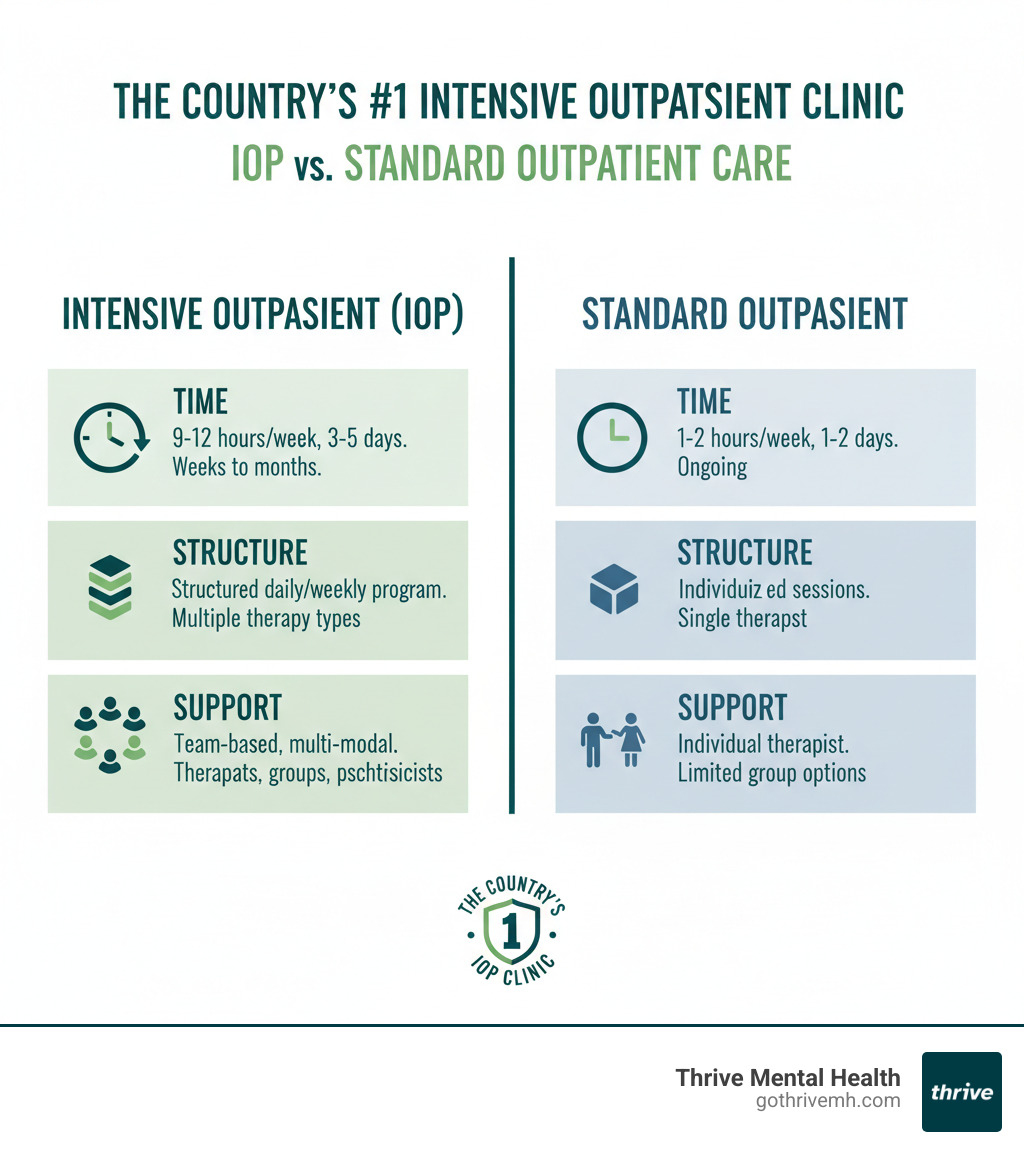5 Tips to Find The country’s #1 intensive outpatient clinic

The country’s #1 intensive outpatient clinic: Solved
Why Finding the Right Intensive Outpatient Clinic Can Change Your Life
Struggling to find real mental health help—without putting your life on hold? Intensive Outpatient Programs (IOP) offer powerful, flexible support when weekly therapy isn’t enough, but you don’t need 24/7 care. This guide cuts through the confusion and shows you exactly how to find the country’s #1 intensive outpatient clinic—so you can get results, not runaround.
What Makes a Top IOP Clinic Stand Out?
- Licensed, master’s-level clinicians delivering trauma-informed, individualized care
- Flexible scheduling (virtual, hybrid, evening options) that fits your life
- Evidence-based therapies like CBT, DBT, EMDR, and group support
- Full continuum of care from intake to aftercare and relapse prevention
- Transparent insurance verification with major PPO plans (Cigna, Aetna, Optum, Florida Blue)
- Proven outcomes backed by data, not just marketing promises
According to SAMHSA, nearly half of U.S. treatment facilities now offer IOP. When appropriately placed, IOP outcomes are comparable to inpatient care at nearly half the cost. But not all IOPs are created equal. Many lack qualified staff, use cookie-cutter plans, or fail to provide the trauma-informed, evidence-based care you deserve. This guide shows you what to look for to find a clinic that delivers real results.
I’m Anna Green, LMHC, LPC, founder of Thrive Mental Health. With training in EMDR and other evidence-based modalities, I’ve spent my career helping people find compassionate, outcome-driven care that fits their real lives. My mission is to make high-quality mental health treatment easier to access, stick with, and afford.

Step 1: Demand Clinical Excellence and Evidence-Based Care
Don’t settle for guesswork. The country’s #1 intensive outpatient clinic uses proven, science-backed therapies delivered by licensed, master’s-level clinicians to treat root causes, not just symptoms. Real recovery requires trauma-informed, individualized care that adapts to your unique needs.
What Sets a Top IOP Apart?
Clinical excellence is everything. The best programs are built on a foundation of licensed, experienced therapists trained in multiple evidence-based modalities, ensuring your care is customized.
- Individualized treatment plans: A top-tier IOP conducts thorough assessments to understand your specific challenges and goals, looking beyond surface symptoms to address deeper patterns.
- Trauma-informed, evidence-based care: Since trauma often underlies mental health and substance use issues, addressing it is critical. Look for clinics integrating approaches like EMDR, Somatic Experiencing, CBT, and DBT to build lasting resilience.
- Dual diagnosis support: Many people struggle with co-occurring mental health disorders (like depression or anxiety) and substance use. A leading clinic treats both simultaneously with integrated care.
- Psychiatric evaluation and medication management: For many, medication is a crucial component of recovery. A comprehensive IOP provides access to psychiatric services and ongoing medication support.
As NIDA research shows, addiction changes the brain. A combined therapy approach that addresses the physical and mental dimensions of addiction is powerful. Recovery isn’t just about quitting substances; it’s about rebuilding a life filled with purpose and connection. The right IOP equips you with the tools and clinical expertise for every step.
Learn about Thrive’s IOP services
Step 2: Check Program Structure, Flexibility, and Duration
A great IOP fits your life, not the other way around. The country’s #1 intensive outpatient clinic provides a structure that accommodates work, school, or family responsibilities while offering robust clinical support. Programs offer a mix of group, individual, and family therapy, plus practical skill-building workshops, delivered on a schedule that works for you.
What to Expect from a High-Quality IOP
A top-tier IOP is a structured yet adaptable path to recovery.
- Duration and Frequency: Most programs run 8 to 12 weeks, with sessions 3 to 5 days per week for about 3 hours each. This provides consistent engagement without the 24/7 commitment of inpatient care.
- Therapy Mix: You’ll engage in group sessions for community, individual therapy for personalized work, and family therapy to rebuild support systems. Educational sessions help you understand the science behind your recovery.
- Core Focus: A quality IOP emphasizes skill-building and relapse prevention, teaching practical coping mechanisms, stress management, and communication strategies for long-term success.
Explore Thrive’s PHP and virtual therapy options
Flexibility for Real Life
Life doesn’t stop for treatment, which is why flexibility is a hallmark of a leading IOP.
- Virtual and hybrid IOP options have been a game-changer, breaking down geographical barriers and making high-quality care accessible from anywhere.
- Evening sessions are specifically designed for working adults and students, so you don’t have to choose between recovery and your career or education.
- For residents in Florida (including Tampa Bay, St. Petersburg, Miami, and Orlando), we offer care that integrates with local resources and understands regional insurance landscapes.

Step 3: Insist on Full Support and a Continuum of Care
Recovery is a journey, not a destination. The country’s #1 intensive outpatient clinic provides support before, during, and long after your program. A top-tier clinic builds a continuum of care around you, linking you to resources, case managers, and peer communities to keep you grounded. This isn’t about a pamphlet on your last day; it’s about a safety net for your future.
Is IOP Right for You?
IOP is an excellent fit if you:
- Need more structure than weekly therapy can provide.
- Are transitioning down from more intensive treatment like residential care or PHP.
- Have a reasonably safe and supportive home environment.
- Are motivated and ready to actively participate in your recovery.
- Need to keep up with work, school, or family responsibilities.
Long-Term Support Matters
Finishing an IOP is a huge accomplishment, but the journey continues. The best clinics provide robust long-term support.
- Relapse prevention and aftercare planning: This starts on day one, creating a personalized roadmap with coping strategies for your unique triggers.
- Alumni and peer support: Connecting with people who’ve walked the same path provides encouragement, accountability, and hope. Community involvement is a strong predictor of long-term success.
- Case management: A dedicated case manager helps coordinate ongoing care and connects you with community resources like housing or vocational support, improving follow-through.
- Vocational support: Getting back to work provides purpose and structure. A comprehensive IOP helps you work toward career goals as part of your healing.
Choosing a clinic with this full spectrum of support means you’re not just getting treatment—you’re building a foundation for a sustainable, meaningful life.
Step 4: Understand Insurance and Affordability Upfront
Don’t let surprise bills derail your recovery. The country’s #1 intensive outpatient clinic is transparent about costs. You deserve to know what your insurance covers and what your out-of-pocket expenses will be before you start. Your focus should be on healing, not navigating confusing insurance jargon. Many are surprised to learn their insurance covers IOP, which can be nearly half the cost of inpatient care with comparable outcomes.
Navigating Insurance for IOP
We offer free, no-obligation insurance verification. Our team contacts your provider, explains your benefits, and clarifies any deductibles or copays so there are no surprises.
- In-Network Coverage: We are in-network with Cigna, Aetna, Optum, Florida Blue, and more, maximizing your coverage and minimizing your cost. We also work with most PPO plans with out-of-network benefits.
- Self-Pay Options: If you don’t have insurance or prefer to self-pay, we can discuss flexible payment options.
Verify your insurance coverage now—it takes about two minutes and provides peace of mind.
Florida Coverage
Our admissions team understands the local insurance landscape in Florida.
- PPO Plans: We frequently work with PPO plans, which offer excellent flexibility and coverage for IOP.
- State Insurance: Please note that state insurances like Florida Medicaid may have coverage limitations with us. We encourage you to call so we can discuss options or connect you with other resources.
The bottom line: Don’t let finances be a barrier to getting help. Let’s figure it out together.

Step 5: Demand Proof—Outcomes and Real Reviews
Don’t trust slick marketing; demand concrete evidence. The country’s #1 intensive outpatient clinic shows you real data on symptom improvement, patient satisfaction scores, and authentic stories from past clients. Your recovery is too important for empty claims.
Reputable programs track their outcomes because they are confident in their results. For example, top clinics often report that over 90% of clients see measurable improvements in depression or test negative for illicit substances after completing a program. External recognition from organizations like Newsweek or Statista also provides important third-party validation.
How to Spot a Clinic That Delivers
Look for a clinic that is eager to share:
- Symptom improvement and recovery rates: This is clear data showing that clients experience significant reductions in depression, anxiety, or substance use.
- Patient satisfaction scores: High scores show that clients feel supported, respected, and hopeful, which research links to better outcomes.
- Real-life stories and reviews: Authentic testimonials describing how a program “saved my life” or helped someone “find peace” offer a glimpse of what’s possible.
Read Thrive’s patient success stories to see what recovery looks like in real life.
Watch out for red flags: Be wary of vague claims without data, an unwillingness to discuss outcomes, or testimonials that sound too polished to be real. A clinic that believes in its work will be transparent.

Frequently Asked Questions about Intensive Outpatient Programs
We know you probably have questions—and that’s completely normal. Choosing the right mental health care is a big decision, and you deserve clear, honest answers. Here are the most common questions we hear from people exploring the country’s #1 intensive outpatient clinic options.
How long does an IOP last?
Most intensive outpatient programs typically run 8–12 weeks, with sessions happening 3–5 days per week. Each session is usually about 3 hours long, giving you enough time for meaningful therapeutic work without taking over your entire day.
That said, there’s no one-size-fits-all timeline. Your specific needs, progress, and goals will shape how long you stay in treatment. Some people benefit from a shorter program, while others find that extending their care a bit longer gives them the foundation they need for lasting recovery. The key is that your treatment plan should be flexible and responsive to your journey.
Can I work or go to school during IOP?
Absolutely, yes. This is one of the biggest advantages of IOP—it’s designed to fit into your real life, not replace it.
We offer flexible scheduling options, including evening sessions and fully virtual programs, specifically so you can keep up with work, school, or family responsibilities while getting the care you need. Many of our clients are working professionals, students, or parents who simply can’t put everything on hold for treatment. An IOP meets you where you are, offering structured support without requiring you to step away from your daily commitments.
Is IOP as effective as inpatient treatment?
For many people, yes—IOP can be just as effective as inpatient care, especially if you’re medically stable, have a relatively supportive home environment, and are genuinely motivated for recovery.
Research from SAMHSA shows that when clients are appropriately matched to their level of care, IOP outcomes are comparable to inpatient treatment—often at nearly half the cost. The key phrase here is “appropriately matched.” The right level of care always depends on your specific situation, symptoms, and support system. During your initial assessment, we’ll help you determine whether IOP is the best fit or if a different level of care would serve you better.
What insurance covers IOP in Florida?
Many major PPO plans cover intensive outpatient programs, including Cigna, Aetna, Optum, and Florida Blue. If you have a PPO plan in Florida, there’s a good chance we can work with your insurance to maximize your benefits and minimize out-of-pocket costs.
That said, state insurances like Florida Medicaid may have limitations on coverage with us. We always recommend verifying your specific benefits before you start—and we make that easy. Our team offers free, no-obligation insurance verification so you know exactly what to expect financially before you commit to anything. No surprises, no hidden fees.
Verify your insurance coverage now
What happens after I finish IOP?
Finishing an IOP is a huge accomplishment—but recovery doesn’t end when the program does. The country’s #1 intensive outpatient clinic will set you up with comprehensive aftercare planning, relapse prevention strategies, and ongoing support to help you maintain your progress long-term.
This might include alumni groups, peer support networks, continued individual therapy, or connection to community resources. The goal is to ensure you have a strong, sustainable support system in place so you never feel like you’re navigating recovery alone. We’re in this with you for the long haul, not just for a few weeks.
If you’re in crisis, call/text 988 right now. You are not alone.
{
"@context": "https://schema.org",
"@type": "FAQPage",
"mainEntity": [{
"@type": "Question",
"name": "How long does an IOP last?",
"acceptedAnswer": {
"@type": "Answer",
"text": "Most IOPs run 8–12 weeks, with 3–5 sessions per week, each about 3 hours. However, treatment duration can vary based on individual needs and progress."
}
},{
"@type": "Question",
"name": "Can I work or go to school during IOP?",
"acceptedAnswer": {
"@type": "Answer",
"text": "Yes. Flexible scheduling (including evenings and virtual options) is a hallmark of IOPs, allowing you to keep up with work, school, or family responsibilities while receiving treatment."
}
},{
"@type": "Question",
"name": "Is IOP as effective as inpatient treatment?",
"acceptedAnswer": {
"@type": "Answer",
"text": "For many individuals, yes—especially if you are medically stable, have a supportive home environment, and are motivated for recovery. Research indicates that when clients are appropriately placed, IOP outcomes can be comparable to inpatient care. The right level of care always depends on your specific needs."
}
},{
"@type": "Question",
"name": "What insurance covers IOP in Florida?",
"acceptedAnswer": {
"@type": "Answer",
"text": "Many major PPO plans (such as Cigna, Aetna, Optum, and Florida Blue) typically cover IOP. State insurances like Florida Medicaid may have limitations on coverage, so it's always best to verify your specific benefits with the clinic."
}
},{
"@type": "Question",
"name": "What happens after I finish IOP?",
"acceptedAnswer": {
"@type": "Answer",
"text": "Top clinics offer comprehensive aftercare planning, alumni support, and relapse prevention strategies to help you maintain your progress and stay on track with your recovery long-term. This often includes connecting you to community resources and ongoing support groups."
}
}]
}
Your Path to Healing Starts Here
Finding the country’s #1 intensive outpatient clinic can truly change your life. By focusing on clinical excellence, flexible care, comprehensive support, clear costs, and proven results, you’ll find a program that empowers your recovery journey. We believe in providing expert-led, virtual and hybrid IOP/PHP with evening options, custom for adults and young professionals across our locations in Florida, including Tampa Bay, St. Petersburg, Miami, and Orlando. Our goal is to make high-quality mental health treatment accessible and effective, helping you thrive.
If you’re in crisis, call/text 988 right now. You are not alone.
Ready for support? Thrive offers virtual and hybrid IOP/PHP with evening options. Verify your insurance in 2 minutes (no obligation) or call 561-203-6085. If you’re in crisis, call/text 988.